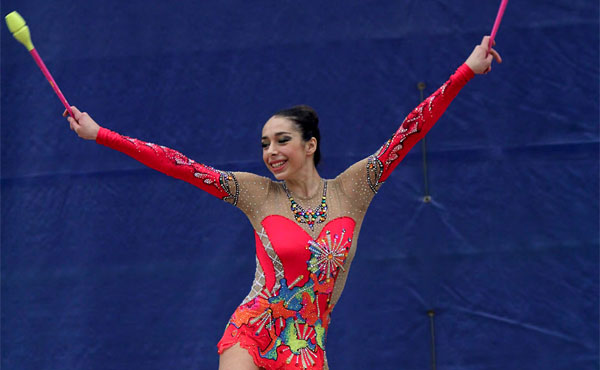
By Cory Collins
"I’ve had a lot of champions," Natalya Kiriyenko says, "but she’s special."
Rebecca Sereda is far removed from the 6-year-old girl who walked into Isadora Rhythmics. Then, she was the girl with a stomachache, the girl of short stature. Today, she’s taller, a body full of grace. Today, she’s a champion.
Just 18, Sereda enters the 2014 season as a two-time senior and three-time junior U.S. all-around champion. And in 2013, she made history alongside Jazzy Kerber, becoming the first U.S. rhythmic gymnastics duo to advance to the finals at a World Championships.
Those moments are where Sereda finds happiness.
"Just getting one step higher or achieving one extra medal, to see progress, when you finish that perfect routine," she explains, "you get that feeling that finally this hard work has paid off.
"When you accomplish that minute-30 [routine], you get that sensation," she said. "You feel so happy. It’s hard to explain. You just realize that everything makes sense…why you put so much effort into it."
That effort, and Sereda’s potential, excites those who wish her success.
"I think that she can go all the way to the Olympics, if she stays healthy," her coach says.
Sereda seems to have similar goals in mind. The girl that, perhaps, never should have made it this far, isn’t satisfied.
"Achieving such a goal, going to World Championships, it obviously felt amazing," says Sereda. "But I have to push myself even harder to get greater achievements."
In international competition, she has reached new heights. Competing on the world stage allowed her to truly travel full circle, to return to the place where this story started.
***
It was the first and last time Rebecca Sereda quit.
The 6 year-old, stocky, big-headed girl clutches a stomach that doesn’t ache, runs into the halls outside the gym at Isadora Rhythmics, and sees her. Her mother. Who had been told she couldn’t watch her daughter’s first practice. Who could have left, but lingers. Who stays.
Sereda finds a way to see she isn’t gone.
That her mother never truly left her side.
***
Janna Sereda immigrated to New York City from the Ukraine, a country that had fallen into economic recession in its early years of independence from the Soviet Union. She sought a different type of freedom. But she didn’t leave her passions, her roots behind.
In the Ukraine, gymnastics was more than sport. It was a way of life.
In 2002, an ad in the newspaper, tucked into the classifieds, helped ease the 9,000-mile distance between Staten Island and the Ukraine’s borders. Isadora Rhythmics was looking for young gymnasts.
And Janna Sereda was looking for a place her daughter could belong.
She always wanted her daughter to fit in. According to Sereda, her mother would focus on teaching American customs and English at home "so I wouldn’t feel left out." And, as always, she stayed at her daughter’s side. She wanted to inhabit that same world.
"She would read books with me," Sereda remembers. "It was like she was learning with me."
Janna Sereda pushed her daughter to be better, but never pushed her too hard, never pushed her away.
Then, suddenly, she left her side.
***
Sereda was 7 when her mother lost her fight against cancer.
And after spending so much time to ensure her daughter would belong, would find her place, the passing of Janna Sereda left Rebecca, an American daughter without a home.
"I wasn’t able to comprehend the situation," Sereda says. "I was so young. I thought she would come back."
"I was left with my sister to take care of me, at first," she adds.
But her sister was unable to raise this 6-year-old "ball of excitement" without a mother’s guidance. And her father, still in the Ukraine and embroiled in his business, couldn’t come to the United States. Not yet.
Rebecca bounced around. First, she lived with some neighbors. She’d lost what she had always known – a stable home.
Little did she know that Janna Sereda had already led her daughter to a surrogate mother, to the woman who would fill a void that can be left in a lonely child’s heart.
Natalya Kiriyenko has been Sereda’s coach since she was 8-years-old, but she saw something special from the moment this fiery girl walked into Isadora’s gym.
"Automatically," she’ll often tell Sereda, "I fell in love with you."
The love was so deep that she took Sereda in. Until her father found a way to New York, she had two homes: Kiriyenko’s house, and Kiriyenko’s gym. She had one constant: her coach’s guidance.
"She’s like a second mother to me," Sereda says. "She took me in when I had issues with my family. Now, we can talk for hours. We’re very close. I feel warmth with her."
"We are very close," Kiriyenko agrees. "Especially with the tragedy in her life."
The success that has resulted from that relationship now has marked Sereda as one to watch in the sport. It’s a history that began with a mother’s hand pointing to words in the newspaper, and seeing a chance; that began with a young girl willing to take it. A girl willing to overcome.
***
Sereda has a simple explanation about why it is difficult for people to see that rhythmic gymnastics is a feat of athleticism: they don’t see the struggle.
"We spend so much time trying to make every movement look effortless," she explains. "Some people underestimate it. It looks so easy."
Sereda always made hardship look effortless. When tragedy, or exhaustion, could have crippled her, she walked forward. She moved on. Her resilience and her work ethic made sure that others didn’t see the struggle.
She lost her mother, but she never lost the drive.
"After my mom passed away, that’s when I started to go somewhere in gymnastics," Sereda admits. "It definitely taught me independence and hard work."
"It could have gone two ways," she continues. "It could have caused my life to be a downfall, but I think it made me the person I am. I fight for everything –I’m strong, and independent. It came the hard way, but it made me the person I am now."
"She could handle anything," Kiriyenko says of Sereda. "It’s amazing how she handles everything. She’s very strong.
"I’ve never had anyone like this."
Just like she did as a child, Sereda pushes herself to belong. But now she does so to belong alongside the best. In the gym, in the classroom, she thrives, for she’s willing to put in the work.
More than 30 hours of practice per week, plus school. According to her coach, during the summer leading up to the World Championships, the daily practices reached seven hours. But Sereda doesn’t complain. She never has. Pain is temporary.
"It’s how you need to excel," she says simply.
It comes at a cost. Recently, Sereda tweeted, "I wish people hung out in the daytime when I’m actually free." It highlighted the struggle of not only being a teenager, but also a world-class athlete who leaves the former behind for the latter.
"100 percent, I’m not a normal teenager," Sereda admits. "And I’m fine with that. I’d rather be a gymnast on the national team. I make the strongest bonds with the people I practice with."
It’s a theme for Sereda. She knows that success and sacrifice are part of the game.
"I’ve accomplished so much right now because I’d still rather go to the gym and practice," she says.
For all the sadness in her journey, Sereda can seek solace in the destination.
***
She had come full circle.
The first time Sereda competed at a World Championship, the gymnastics community gathered in the place her mother left behind: the Ukraine. She’d visited before, but it was special going years after her mother’s death.
"It was definitely great to compete in my parents’ home country," she says.
When Sereda travels now with Team USA, taking in the culture of Europe, she can’t help but think of a reluctant little girl. At 6 or 7-years-old, her mother took her to France and Italy. Janna Sereda wanted her daughter to see other places, other ways of life.
"She’d drag me to all these museums," Sereda remembers. "She wanted me to be cultured. The fact that I’ve gotten to travel to all these places…my mom would be so proud."
"Travelling," she adds, "kind of kept us together as a family."
More than a decade later, that much hasn’t changed. Sereda competes nationally and abroad, carrying with her the woman who once introduced her to a lifelong coach and friend, the woman who once introduced her to the world beyond Staten Island.
"I would hope she’d be so proud of me because I’ve accomplished so much," Sereda says. "To see I’ve gone so far both in gymnastics and my education."
You have to wonder if, as Sereda takes to the floor, when the music starts, if she gets nervous. If she gets a little sick to her stomach. If she considers bolting for the halls beyond the judges’ stares. Who would blame her? Sometimes there is no lonelier place than beneath the spotlight.
But she lingers; she stays. Because she knows.
That her mother never truly left her side.




